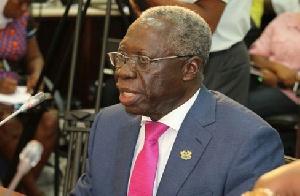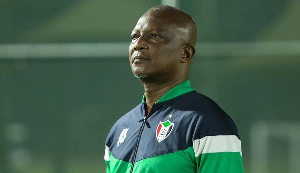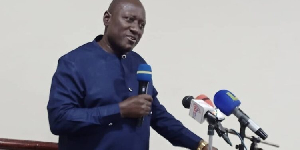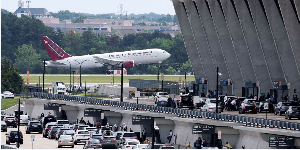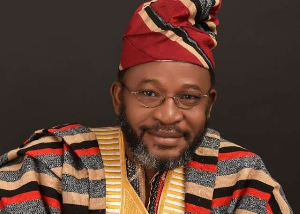Mr Yaw Osafo-Maafo, the Senior Minister, on Monday, commended the Ghanaian legal team that secured a historic legal victory against the Cote d’Ivoire in the long-standing marine boundary dispute.
He lauded Madam Gloria Akuffo, the Attorney- General and Minister of Justice, the head of the legal team and Madam Marietta Brew Appiah-Oppong, her former colleague, for working together as a team to chalk the success.
He noted that if Ghana had lost the legal tussle to her West African neighbours, it would have had serious financial and economic implications on the nation.
He expressed happiness that, the legal team put away their political differences and worked on a united front in the best interest of the nation, saying; ‘‘The issue at stake was not either NPP or NDC matter, but Ghana issue, therefore, they all deserve commendation’’.
Mr Osafo-Maafo made these remarks at the Ghana Public Private Partnership (PPP) programme on the Upgrading of the Accra-Tema Motorway Initial Market Sounding, in Accra, on Monday.
He said the government needed financial resources for infrastructural development and noted that, it would have been consequential if Ghana had lost.
On Saturday, September 23, the Special Chamber of the International Tribunal of the Law of the Sea (ITLO), in Hamburg, Germany, ruled that Ghana had not violated Cote d’Ivoire’s marine boundary. The Tribunal rejected Ivory Coast’s argument that Ghana’s coastline is unstable.
The President of the Chamber, Justice Boualam Bouguetaia, accepted Ghana’s argument of the adoption of the equidistance method of delineation of the marine boundary.
Ghana has huge economic interest at the west of Cape Three Points in the Western Region, near the border of Ivory Coast after Tullow plc and other oil companies discovered commercial quantities of hydrocarbons in 2007.
The country has since 2010 drilled oil wells and produced huge volumes of petroleum products from the area, which has impacted positively on the nation’s economic fortunes.
The oil resources have been used as sovereign guarantee for Euro Bonds, which had fetched Ghana billions of dollars.
On road infrastructure, Mr Osafo-Maafo said, the construction of roads in the country should meet international standards with common industrial pricing and ensure value for money.
He noted that there was a lot of corruption in the costing of roads in the country and therefore, urged the Sector Minister to be vigilant and ensure that all roads constructed met specifications.
He said the private sector played a crucial role in the infrastructure development of every nation, therefore, Ghana would leverage on the financial resources of the public private partnerships to accelerate infrastructural development.
Mr Osafo-Maafo said the 19.5 kilometre Accra-Tema Motorway, which was constructed in 1964 was of high quality, adding; ‘‘All roads that would be constructed in the country should be done with high quality materials so that they can last longer’’.
He, therefore, called for the culture of maintenance to be embedded in every public infrastructure to ensure value for money.
He said: ‘‘The residence engineer supposed to be at the construction site and supervise the work so that the materials used for the construction, meet specifications and international standards’’.
Mr Kwasi Amoako-Atta, the Minister of Roads and Highways, in his welcome address, said the Government would harness financial resources of the private sector under the Public Private Partnership arrangement to accelerate infrastructure development.
Currently, he said, the country’s annual infrastructure gap stood at one billion dollars with the road sector alone hovering around 400 million dollars.
Government, he said would explore private sector financial strength for infrastructure development, especially in the road sector so that, it would free scarce public finances for development and maintenance purposes.
Ghana currently does not have a specific legislation governing the implementation of PPP, and there is an ongoing effort to enact a PPP law. The PPP Bill is currently before Parliament and government expects the bill to be passed into law by the end of the year.
Notwithstanding, the absence of a specific PPP law, there have been efforts to provide for a framework for implementation of PPP in Ghana. On June 3, 2011, a National Policy on PPP Policy was approved by the then Cabinet, to guide the implementation of PPP in Ghana.
The purpose of the PPP arrangement is to provide clear and consistent guidance for all aspects of the PPP project development and implementation, including project identification, project preparation, procurement processes, evaluation and selection and contracting with a successful private partner.
General News of Tuesday, 26 September 2017
Source: ghananewsagency.org

